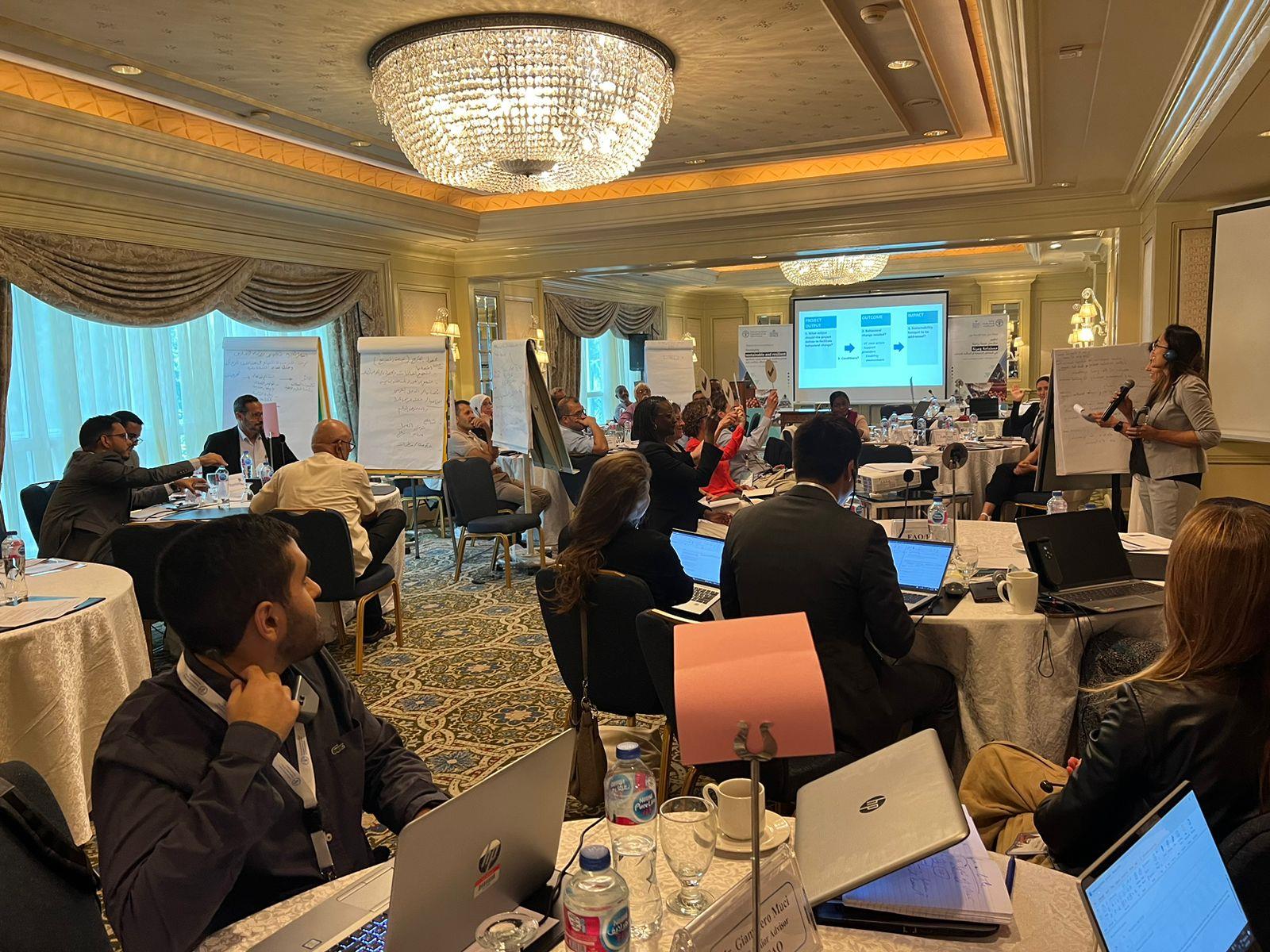FAO technical workshop on developing sustainable and resilient agrifood value chains in conflict

Cairo – The FAO Regional Office for the Near East and North Africa (FAO-RNE) organized a four-day regional workshop in Cairo, Egypt, focused on improving the capacity of countries in the analysis and design of agrifood value chains in conflict-prone and conflict-affected contexts in the Near East and North Africa region (NENA). The workshop marked the release of a new guideline on the subject, an initiative spearheaded by FAO-RNE that combines two streams of FAO’s normative work on sustainable food value chain (SFVC) development and conflict-sensitive programming approaches.
Under one umbrella, high-level representatives from six NENA countries and six international organization gathered to learned more about the four steps of developing agrifood value chains in conflict-prone and conflict-affected contexts, namely, context analysis, value chain selection, value chain analysis and value chain design. In light of specific contexts of agrifood value chains in each country, participants discussed and identified the main benefits, barriers, opportunities, and required resources for implementing the new guidelines, which will enhance relevance and efficiency of agrifood systems projects and programs in countries.
A fragile region
“The region is historically characterized by fragility and has witnessed unprecedented conflicts which have brought a growing number of economic, social and environmental disruptions with significant impact on agrifood value chains,” said Serge Nakouzi, FAO Deputy Regional Representative for the Near East and North Africa (NENA).
Agrifood value chains in NENA have been affected by the negative impacts of the COVID-19 pandemic and the conflict between Ukraine and Russia which has resulted in a general rise in the price of agricultural inputs and agrifood products worldwide. Along with these shocks are further stresses of extreme weather events, climate change and natural resource degradation, poverty, social and gender inequalities, population displacement, weak institutions and poor governance, and conflict. They have contributed to a historic setback in tackling food insecurity and, more generally, have placed populations in situations of vulnerability, thus challenging the effective contribution of agrifood value chains to achieving the SDGs.
Serge Nakouzi also remarked, “While sustainable agrifood value chain development is deeply interrelated with the broader sustainable development objectives, it is much more complex and challenging in conflict-prone and conflict-affected contexts. The guideline discussed in this regional workshop fills a major gap for practitioners and decision-makers to effectively support value chain actors towards more sustainable and resilient production and prosperity in their businesses and livelihoods”.
Strong demand for a tailored guideline to increase the resilience of agrifood value chains
“In the light of the vulnerabilities of agrifood systems our region it is urgent to strengthen the resilience of agrifood value chains so that they can anticipate, adapt and efficiently respond to shocks,” says Maryam Rezaei, Agro-Industry Officer, FAO Regional Office for the Near East and North Africa. “Countries in the region have shown a strong demand for tailored tools and approaches to address specific challenges in each context. To address these particular needs, a unique guideline on developing sustainable and resilient agrifood value chains in conflict-prone and conflict-affected context was developed drawing on FAO expertise and experience from NENA and across the organization.”
She added, “it provides guidance on the selection, analysis and design of agrifood value chains in an all-in-one document, while combining a rigorous theoretical framework with concrete examples which make it practical and fit-for-purpose.”
Putting guidance into practice
The emphasis of the workshop was on implementation and action. The workshop was an opportunity for representatives of governments and international organizations from countries affected by conflict in the NENA region to provide their perspectives, views, and priorities to be taken into consideration when supporting agrifood value chain development in their context using the new guideline. It was also a forum for dialogue and partnership-building to address common problems, solutions, and resource-sharing that is essential to making the agrifood systems in the NENA region more inclusive, resilient and sustainable.
For more information on FAO’s regional priority area on sustainable and inclusive agrifood value chains development: https://www.fao.org/neareast/action-areas/agrifoodvaluechains/en/
